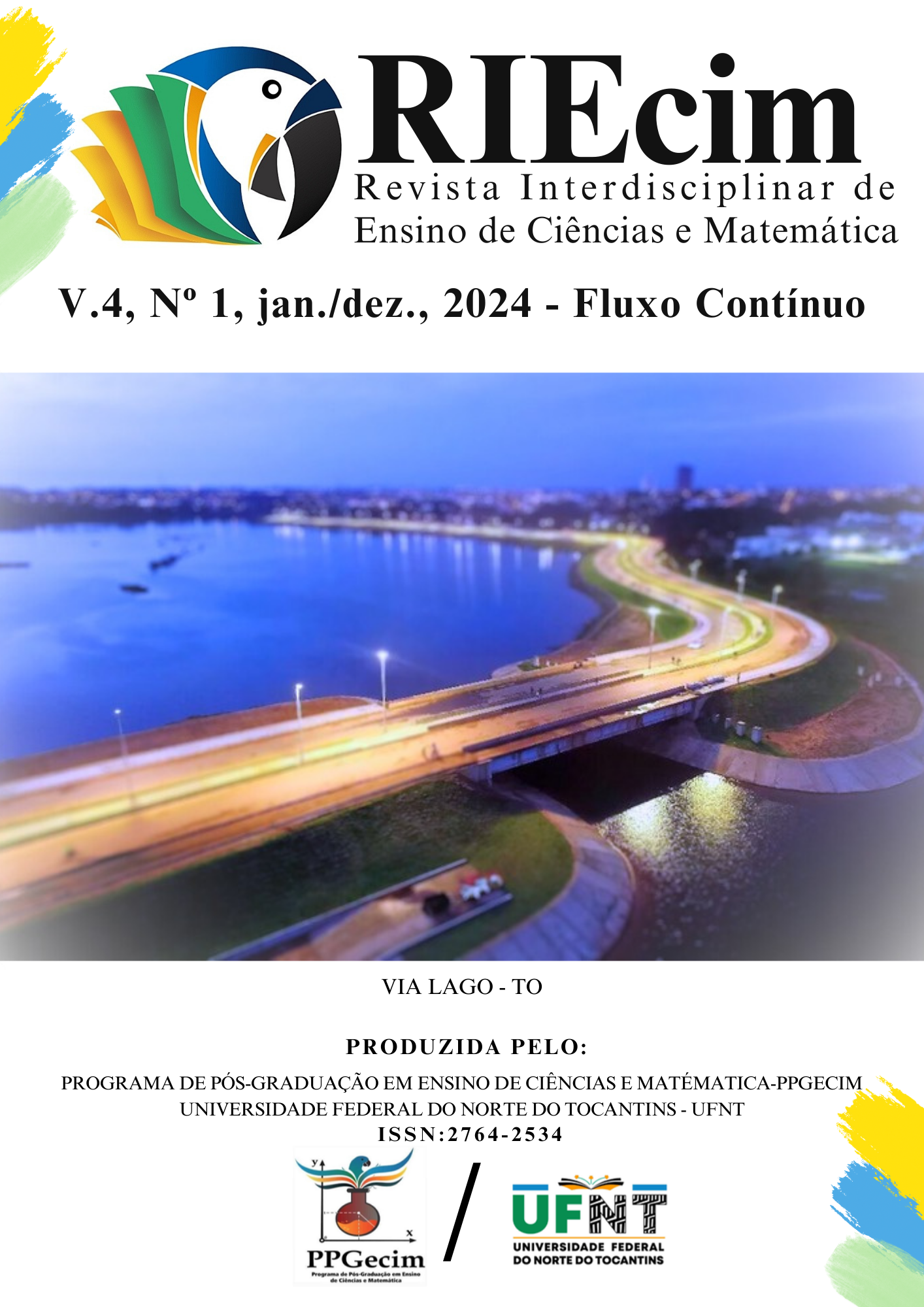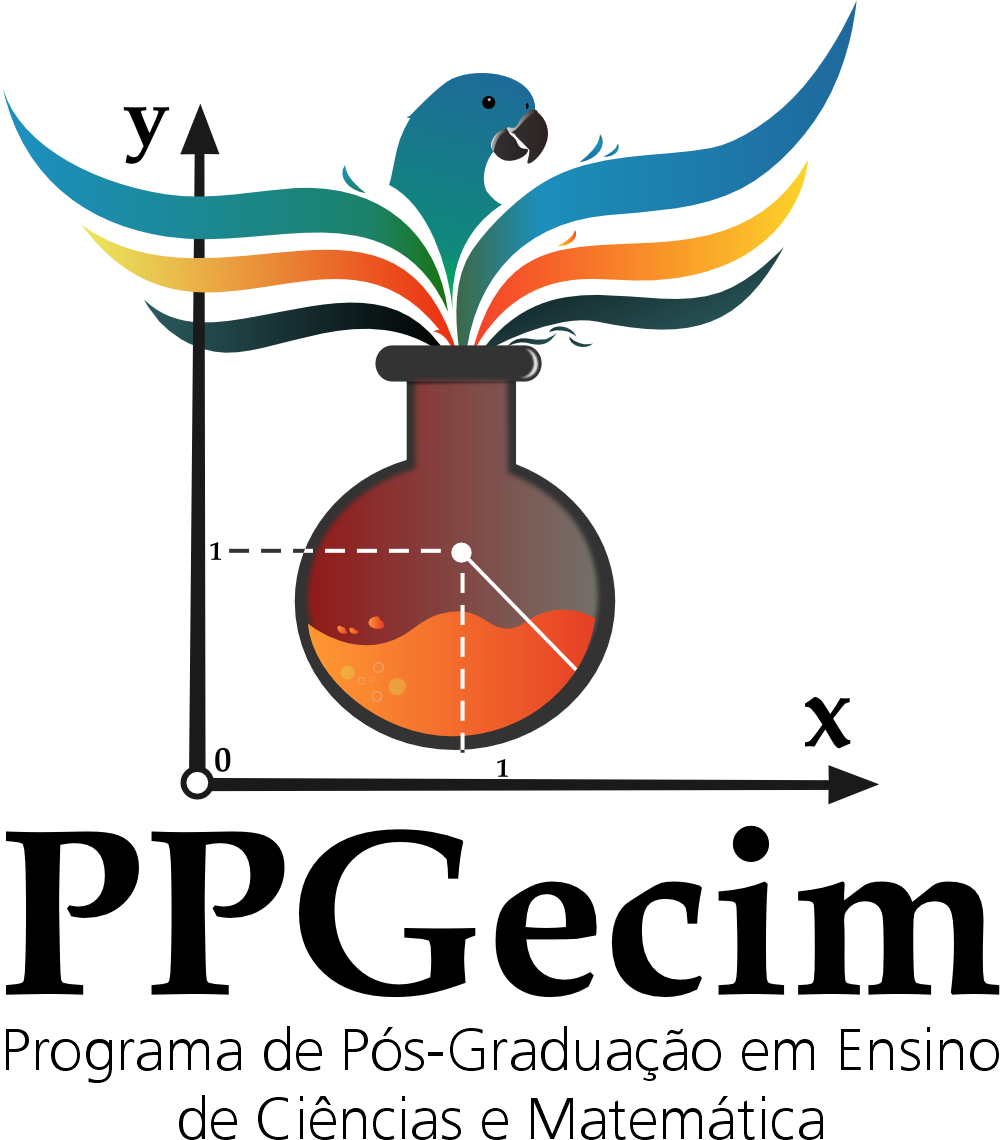CHEMISTRY EDUCATION AND THE NOVO ENSINO MÉDIO (NEM): NARRATIVES AND KNOWLEDGES OF SEDUC-MT’S TEACHERS IN FOCUS
DOI:
https://doi.org/10.70860/RIEcim.2764-2534.2024.v4.19293Keywords:
Chemistry Education, Novo Ensino Médio, PCKAbstract
In the realm of exploring the role of educators, the significance of essential knowledge sets crucial to the teaching profession, extensively researched within academia, stands out. This article delves into the domain of Chemistry education, investigating the outlooks and expectations of a cohort of educators who joined Mato Grosso's state education network (SEDUC-MT) through a public competition (2017/1), amid the advent of the Novo Ensino Médio (NEM). The study seeks to uncover: How do the perspectives, experiences, and personal journeys of Chemistry teachers from SEDUC/MT in Cuiabá shape their professional growth as they describe their teaching practices within the framework of the Novo Ensino Médio? The research adopts a narrative methodology, facilitating a nuanced exploration of both individual and collective narratives among educators. Data collection includes semi-structured interviews, providing a platform for educators to share insights and reflections on how changes in the NEM curriculum and methodologies impact their teaching approaches. The analysis employs Discursive Textual Analysis, not only scrutinizing the explicit content of narratives but also revealing the social contexts and underlying meanings inherent in the pedagogical practices discussed. This study aspires to advance discourse on basic education curriculum and contribute to the formulation of public policies aimed at enhancing teacher education. Furthermore, it aims to delve into the intricate interplay of essential knowledge crucial to pedagogical practice, such as Pedagogical Content Knowledge (PCK) outlined by Shulman, in a manner that is both contextually grounded and idiosyncratic.
References
ARROYO, M. G. (2000). A formação de professores: desafios e perspectivas. São Paulo: Editora X.
BARBOSA, F. F. Sem química? O “novo” ensino médio e o (des)letramento científico como projeto. Revista Interdisciplinar em Ensino de Ciências e Matemática (RIEcim), Araguaína/TO, v. 3, n. 1, e23005, jan./dez. 2023. DOI: https://doi.org/10.20873/riecim.v3i1.17121
BRASIL. (2018). Base Nacional Comum Curricular. Brasília: Ministério da Educação.
CHASSOT, A. I. Alfabetização científica: questões e desafios para a educação. 1. ed. Ijuí: Ed. Unijuí, 2014.
CLANDININ, D. J.; CONNELLY, F. M. (2011). Narrative inquiry: a relational approach to research. New York: Wiley.
CRESWELL, J. W. (2014). Research design: qualitative, quantitative, and mixed methods approaches. Thousand Oaks: Sage Publications.
FERNANDEZ, M. (2015). Metodologia da pesquisa em educação. São Paulo: Editora Z.
FLORIANO, L. S. Conhecimento Especializado de Professores de Química (CTSK): Um Estudo de Caso do Ensino de Termoquímica nas Práticas de Dois Professores de Cuiabá – MT. 2021. 116 p. Dissertação de Mestrado em Ensino – Programa de Pós-Graduação Stricto Sensu em Ensino, Instituto Federal de Educação, Ciência e Tecnologia de Mato Grosso (IFMT), Cuiabá, 2021.
GALVÃO, T. (2005). Formação de professores: desafios e possibilidades. Porto Alegre: Editora U.
GOES, L. F. Conhecimento Pedagógico do Conteúdo: estado da arte no campo da educação e no ensino de Química. 155f. Dissertação (Mestrado em Ensino de Ciências), – Instituto de Química, Universidade de São Paulo, São Paulo, 2014.
MAFRA, J. R. e S.; OLIVEIRA, A. J. de; OLIVEIRA, A. J.; PEREIRA FILHO, C. R. M. Residência Pedagógica e a Formação docente: Estabelecendo Conexões na perspectiva de preceptores. Revista Interdisciplinar em Ensino de Ciências e Matemática, Araguaína/TO, v. 3, n. 1, e23019, jan./dez. 2023. DOI: https://doi.org/10.20873/riecim.v3i1.17977. DOI: https://doi.org/10.20873/riecim.v3i1.17977
MARQUES, A. (2003). A prática docente e a formação de professores. Rio de Janeiro: Editora R.
MIZUKAMI, M. G. N. (2013). Ensino: as abordagens do processo. São Paulo: EPU.
MORIN, E. (2006). Introdução ao pensamento complexo. Porto Alegre: Sulina.
MORIN, E. (2011). A cabeça bem-feita: repensar a reforma, reformar o pensamento. Rio de Janeiro: Bertrand Brasil.
MORAES, R.; GALIAZZI, M. C. (2011). Análise textual discursiva. Ijuí: Editora Unijuí.
NÓVOA, A. (1992). Vidas de professores. Porto: Porto Editora.
NÓVOA, A. (2019). Os professores e a sua formação num tempo de metamorfose da escola. Lisboa: Educa. DOI: https://doi.org/10.1590/2175-623684910
OLIVEIRA, L. (2019). Formação de professores: desafios e perspectivas. São Paulo: Editora Q.
PIMENTA, S. G. (org). Saberes pedagógicos e atividade docente. São Paulo: Cortez, 2012.296 p
RIBEIRO, M. T. D. Saberes Científicos e Pedagógicos de Conteúdo Expressos por Professores Egressos do Programa de Bolsa de Iniciação à Docência em Química da UFMT. 2016. 160f. Tese (Doutorado) - Universidade Federal de Mato Grosso, Rede Amazônica de Educação em Ciências e Matemática, Programa de Pós-Graduação em Ensino de Ciências e Matemática, Cuiabá, 2016
SANTOS, M. F. (Org.). Dicionário de Filosofia. 13. ed. São Paulo: Editora É Realizações, 2017.
SHULMAN, L. S. (1986). Those who understand: knowledge growth in teaching. Educational Researcher, v. 15, n. 2, p. 4-14. DOI: https://doi.org/10.3102/0013189X015002004
SHULMAN, L. S. (1987). Knowledge and teaching: foundations of the new reform. Harvard Educational Review, v. 57, n. 1, p. 1-22. DOI: https://doi.org/10.17763/haer.57.1.j463w79r56455411
SILVA, B. V. C. O Conhecimento Pedagógico do Conteúdo: Modelos e Implicações ao Ensino De Ciências. In: Revista Epistemologia e Práxis Educativa. n. 02, v. 03. mai./ago. 2020
SILVA, D. S; MATOS, P. M; ALMEIDA, D. M. Métodos avaliativos no processo de ensino e aprendizagem: uma revisão. Cadernos de Educação | FaE/PPGE/UFPel. Pelotas .v.47, n 4651. p 73-84. Pelotas/RS. janeiro/abril 2014 DOI: https://doi.org/10.15210/caduc.v0i47.4651
SOARES, S. T. C. Conhecimento especializado de professores de Química – CTSK: proposta de modelo teórico. 2019. 113 f. Dissertação (Mestrado em Ensino) – IFMT, Cuiabá, 2019. Disponível em: http://bit.ly/39VM6Jt. Acesso em: 12 abr. 2023.
SOCIETY OF BRAZILIAN CHEMISTRY EDUCATION (SBEnQ). Nota de repúdio da reforma do Novo Ensino Médio. Disponível em: https://portal.sbenq.org.br/nota-de-repudio-da-reforma-da-reforma-do-novo-ensino-medio/. Acesso em: 10 de julho de 2024.
TARDIF, M. (2014). Saberes docentes e formação profissional. Petrópolis: Editora X.
ZABALZA, M. A. (2004). A formação de professores: uma questão de identidade. Porto: Porto Editora.
Downloads
Published
How to Cite
Issue
Section
License
Copyright (c) 2024 Léo da Silva Floriano, Marcos Oliveira de Araújo, Marcel Thiago Damasceno Ribeiro

This work is licensed under a Creative Commons Attribution-NonCommercial 4.0 International License.
Copyright Policy
Copyrights are retained by the authors, who grant RIEcim the exclusive rights for first publication. Authors will not be remunerated for the publication of their work in this journal. Authors are permitted to enter into separate, additional contractual arrangements for the non-exclusive distribution of the work's published version in this journal (e.g., post it to an institutional repository, on a personal website, publish a translation, or as a book chapter), with acknowledgement of authorship and initial publication in this journal. The Journal's editors have the right to make textual adjustments and adaptations to conform to publication standards.
Open Access Policy
This journal provides immediate open access to its content, following the principle that freely providing scientific knowledge to the public contributes to the global democratization of knowledge. Users can read, download, copy, distribute, print, search, or use the content for any legal purpose, respecting national copyright laws and without seeking prior permission from the publisher or the author. The opinions presented in the articles are the responsibility of the authors. The Journal does not charge Article Processing Charges (APCs).
Licensing Policy - Usage License
Licensed under the Creative Commons Attribution-NonCommercial 4.0 International (CC BY-NC 4.0) License. This license allows sharing, copying, redistributing the manuscripts published in RIEcim in any medium or format. Additionally, it allows adapting, remixing, transforming, and building upon the material, as long as proper credit is given to the author and initial publication in this journal is acknowledged.

































